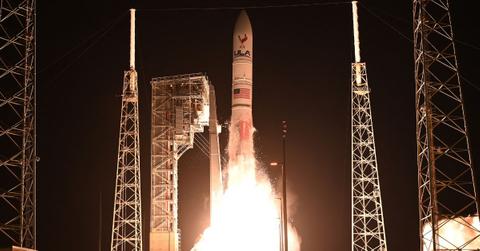Mission Unaccomplished: Peregrine Spacecraft's Journey to Moon Lost in Space, Has 'No Chance’ of Landing

A United Launch Alliance (ULA) Vulcan rocket launches at 2:18 a.m. on its maiden flight from Complex 41 at the Cape Canaveral Space Force Station, Florida on Jan. 8, 2024.
Jan. 22 2024, Published 9:59 a.m. ET
Gene Roddenberry's remains and DNA, intended for a lunar journey with the Peregrine spacecraft, face an unfortunate fate of being lost in space.
The visionary creator of Star Trek had hoped for a historic moment as his remains were meant to reach the moon alongside the Peregrine, in collaboration with NASA. However, engineers now confirm that the payload has “no chance” of achieving a “soft landing” on the moon.
The ambitious Peregrine voyage aimed to be the first private craft to execute a controlled lunar landing, in what could have been a groundbreaking achievement. Unfortunately, a propellant leak derailed the mission, preventing it from reaching its intended destination.
In a press release, Astrobotic Technology stated, "Given the propellant leak, there is, unfortunately, no chance of a soft landing on the Moon. However, we do still have enough propellant to continue to operate the vehicle as a spacecraft."
Originally slated to be the first U.S. space flight to the moon since the 1970s, Peregrine's mission came to an abrupt end due to the propellant leak. Despite the setback, engineers are now focused on gathering valuable information for future space flights, shifting gears to salvage what they can from the mission.
Astrobotic Technology provided insights into the malfunction, attributing it to a valve failure between the helium pressurant and the oxidizer. This failure resulted in a surge of high-pressure helium, exceeding the operating limit of the oxidizer tank and causing it to rupture.
Peregrine, carrying a diverse payload in addition to the human remains and DNA, including a copy of Wikipedia, a bitcoin-loaded physical coin, DHL "moonboxes" with novels, photographs and a piece of Mount Everest, was launched without issues from Cape Canaveral, Florida.
However, shortly after separating from its Vulcan rocket, an “anomaly” with the propulsion system was reported. Despite efforts to realign the spaceship, the loss of fuel rendered it unable to complete the lunar journey.
Never miss a story — sign up for the Front Page Detectives newsletter. Be on the scene the moment news breaks.
While the Peregrine may not fulfill its original mission, developers find solace in the successful launch of the Vulcan rocket, a privately funded project by Boeing and Lockheed Martin, featuring engines from Blue Origin.
The launch, described as "dead on bullseye," positions Vulcan as a potential competitor to Elon Musk's reusable Falcon 9 rockets.
Become a Front Page Detective
Sign up to receive breaking
Front Page Detectives
news and exclusive investigations.
